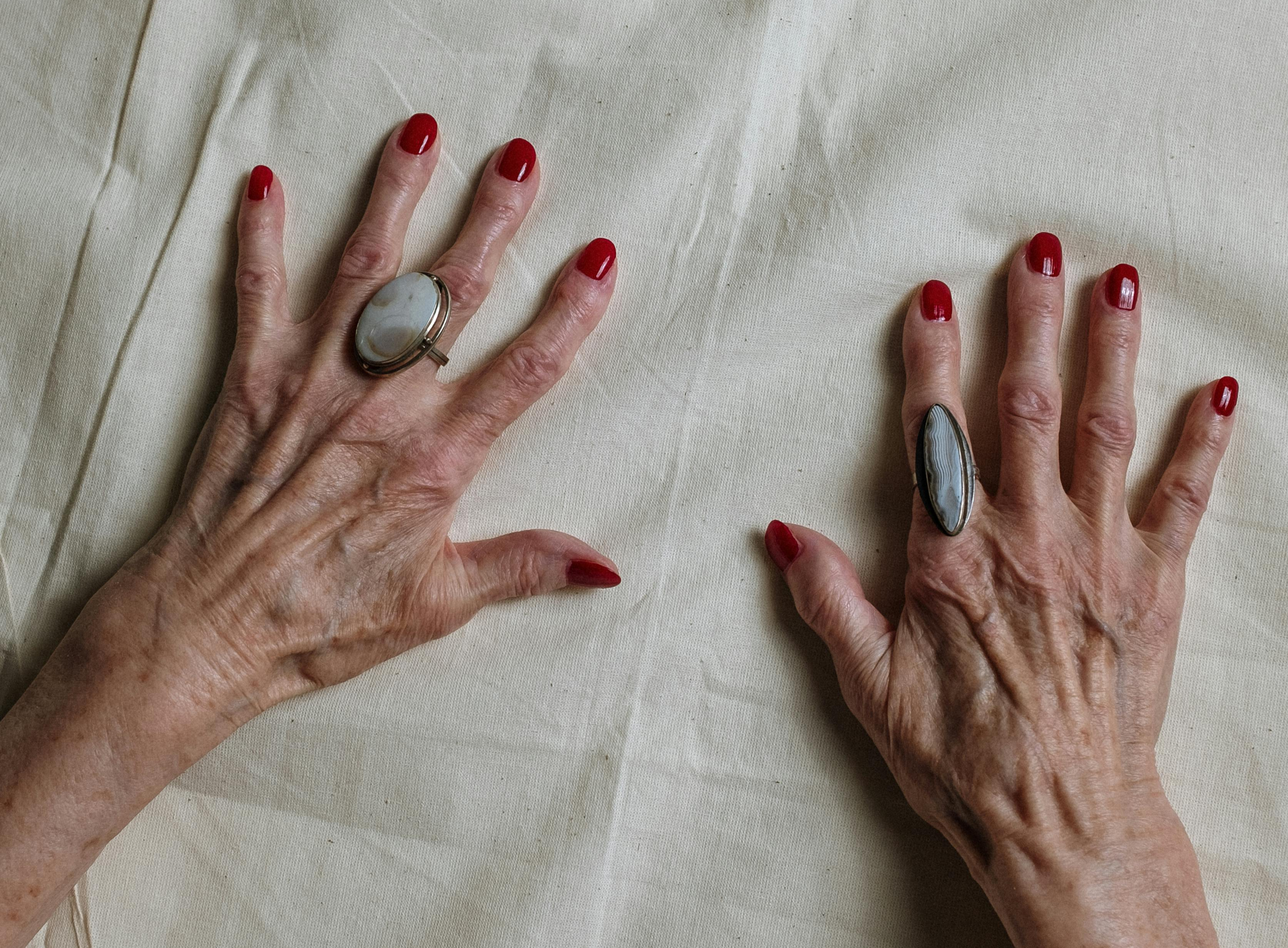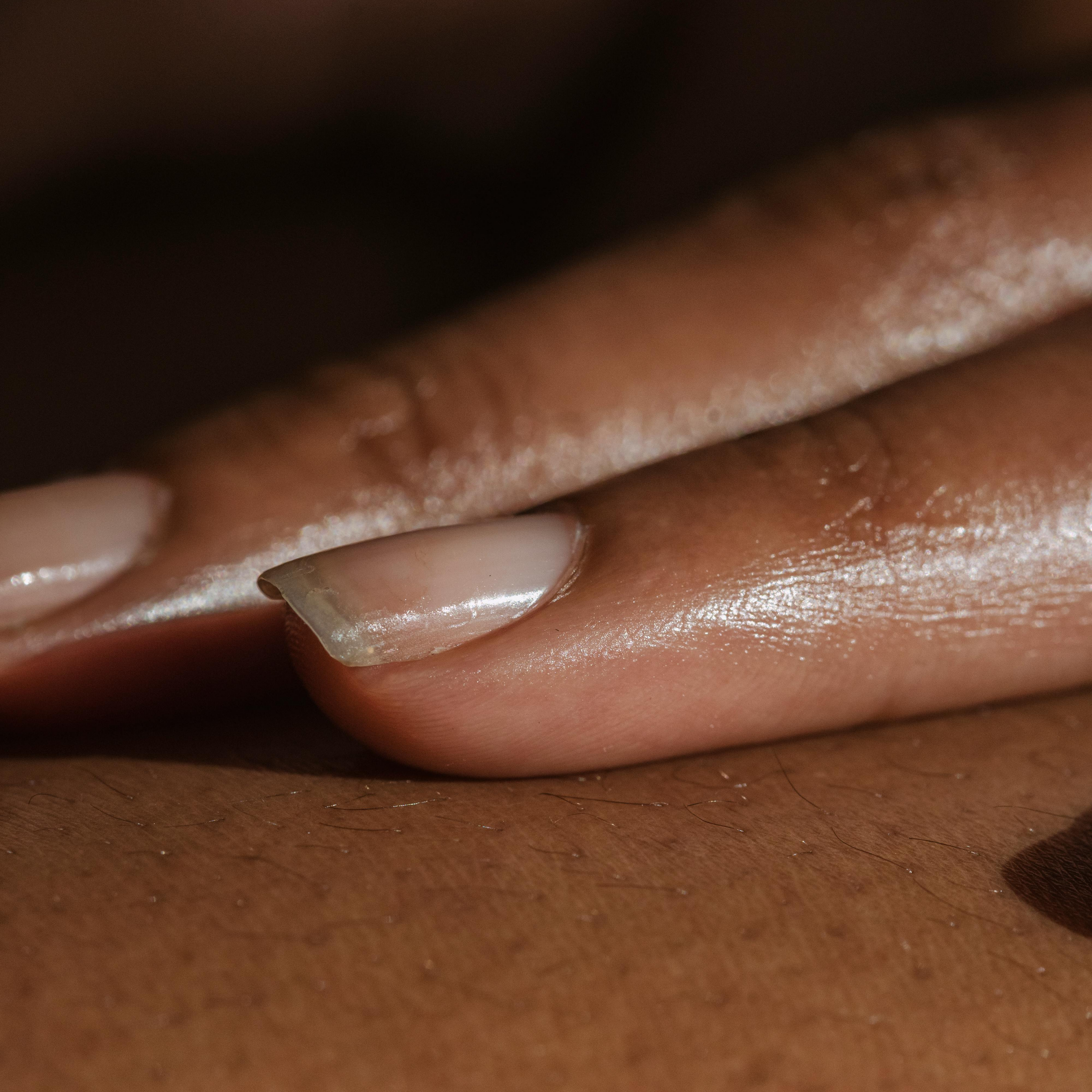Have you noticed your nails becoming more brittle, peeling, or breaking more easily during menopause? You’re not alone. These changes are common and often linked to the hormonal shifts that occur during this stage of life.
As oestrogen levels decline, your body’s ability to retain moisture and absorb certain nutrients decreases, which can weaken nails and make them more prone to damage. But the good news is that with the right care and small lifestyle changes, you can restore your nails’ strengthen and improve their appearance.
In this guide, you’ll learn why menopause affects nail health and discover practical steps to keep your nails strong, healthy, and beautiful.
Why Menopause Affects Your Nails

During menopause, several factors contribute to changes in nail health:
1. Declining Oestrogen Levels
Oestrogen plays a key role in retaining moisture in your skin and nails. As levels drop, your nails can become dry and brittle, making them more likely to break or peel.
2. Reduced Collagen Production
Collagen, a protein that provides structure to your nails, skin, and hair, decreases naturally with age. Lower collagen levels can weaken the nail bed, leading to more frequent breakage.
3. Nutritional Deficiencies
Menopause can affect how your body absorbs nutrients like biotin, zinc, and iron—all of which are essential for nail strength. These deficiencies can cause nails to thin, crack, or grow more slowly.
4. Environmental Factors
Frequent exposure to water, harsh cleaning products, or nail polish removers can exacerbate brittleness, especially during menopause when nails are already more fragile.
Understanding these causes is the first step to addressing brittle nails. With the right approach, you can counteract these effects and restore your nails’ natural strength.
Daily Habits to Strengthen Your Nails
Improving nail strength during menopause starts with small, consistent habits. These changes can protect your nails from further damage and encourage healthy growth.
1. Keep Your Nails Hydrated
- Why it matters: Menopause often reduces moisture levels in your skin and nails, leading to dryness and brittleness.
- What to do:
- Apply a nourishing cuticle oil or hand cream daily, focusing on the nail bed.
- Look for products containing ingredients like jojoba oil, shea butter, or vitamin E for maximum hydration.
2. Protect Your Nails
- Why it matters: Overexposure to water or harsh chemicals can weaken nails further.
- What to do:
- Wear gloves while washing dishes, cleaning, or gardening to shield your nails.
- Avoid prolonged soaking of hands in water, as this can strip nails of essential oils.
3. Trim and File Regularly
- Why it matters: Keeping nails at a manageable length reduces the risk of breakage.
- What to do:
- Trim your nails straight across with clean, sharp clippers to prevent splits.
- Use a gentle nail file to smooth edges, working in one direction to avoid weakening the nail layers.
4. Use Nail-Friendly Products
- Why it matters: Harsh nail polish removers and drying nail polishes can worsen brittleness.
- What to do:
- Opt for acetone-free nail polish remover.
- Use nail polishes fortified with strengthening ingredients like keratin or calcium.
5. Avoid Overusing Acrylics or Gel Nails
- Why it matters: Frequent use of artificial nails or gel manicures can thin and weaken your natural nails over time.
- What to do:
- Give your nails breaks between applications to recover and strengthen.
- Choose natural manicures with nourishing treatments instead.
By incorporating these habits into your routine, you can create a healthier environment for your nails to grow strong and resilient.
Best Foods for Healthy Nails
Your diet plays a crucial role in maintaining strong, healthy nails. During menopause, focusing on nutrient-rich foods can help counteract hormonal changes and support nail growth and repair.
1. Protein-Rich Foods
- Why it matters: Nails are made of keratin, a protein, so getting enough protein in your diet is essential for strong nails.
- Examples:
- Lean meats like chicken or turkey.
- Plant-based sources like lentils, chickpeas, and tofu.
- Eggs, which also contain biotin, a key nutrient for nail health.
2. Foods High in Biotin
- Why it matters: Biotin is a B vitamin that strengthens brittle nails and promotes growth.
- Examples:
- Almonds, walnuts, and peanuts.
- Sweet potatoes and spinach.
- Whole grains like oats and barley.
3. Calcium-Rich Foods
- Why it matters: Calcium supports nail strength and helps prevent breakage.
- Examples:
- Dairy products such as milk, yoghurt, and cheese.
- Fortified plant-based milks like almond or soy milk.
- Leafy greens such as kale and broccoli.
4. Zinc-Packed Foods
- Why it matters: Zinc helps with nail growth and repair, preventing white spots and brittleness.
- Examples:
- Pumpkin seeds, sesame seeds, and cashews.
- Shellfish like oysters and shrimp.
- Beans and lentils.
5. Iron-Rich Foods
- Why it matters: Iron deficiency can lead to thin, brittle nails with ridges.
- Examples:
- Red meat and poultry.
- Leafy greens like spinach and Swiss chard.
- Iron-fortified cereals and grains.
6. Foods Rich in Omega-3 Fatty Acids
- Why it matters: Omega-3s help keep nails hydrated and reduce inflammation around the nail bed.
- Examples:
- Fatty fish like salmon, mackerel, and sardines.
- Flaxseeds and chia seeds.
- Walnuts and avocado.
7. Vitamin C Sources
- Why it matters: Vitamin C helps your body produce collagen, which strengthens the nail bed.
- Examples:
- Oranges, strawberries, and kiwi.
- Bell peppers and tomatoes.
- Berries like blueberries and raspberries.
Eating a balanced diet with these foods can significantly improve your nail strength and health over time.
Supplements That Help Strengthen Nails
While a nutrient-rich diet is the foundation for healthy nails, supplements can help fill any nutritional gaps and accelerate results. Here are the most effective supplements for strengthening brittle nails during menopause:
1. Biotin
- What it does: Biotin (Vitamin B7) promotes keratin production, improving nail thickness and preventing splitting.
- Research-backed benefits: Studies have shown that biotin supplementation can significantly improve brittle nails in 6-12 weeks.
- Dosage: 2.5 mg (2,500 mcg) daily is commonly recommended for nail health.
2. Collagen Peptides
- What it does: Collagen supports nail strength by maintaining the structure of the nail bed. It also improves skin elasticity, which can benefit your cuticles.
- Research-backed benefits: Regular collagen supplementation has been linked to faster nail growth and fewer breakages.
- Dosage: 5-10 grams daily, often in powder form mixed with water or smoothies.
3. Zinc
- What it does: Zinc aids in nail growth and repair, reducing white spots and brittleness.
- Research-backed benefits: Zinc supplementation can help improve overall nail integrity, especially in cases of deficiency.
- Dosage: 8-11 mg daily for adult women.
4. Vitamin D
- What it does: Vitamin D plays a crucial role in calcium absorption, supporting strong nails and bones.
- Research-backed benefits: Deficiency in Vitamin D is often linked to slower nail growth and brittleness.
- Dosage: 800-1,000 IU daily, or as recommended by your GP.
5. Omega-3 Fatty Acids
- What it does: Omega-3s hydrate nails and reduce inflammation around the nail bed, preventing dryness and breakage.
- Research-backed benefits: Regular omega-3 intake has been shown to improve overall nail flexibility and resilience.
- Dosage: 1,000-2,000 mg of EPA and DHA daily.
Choosing the Right Supplement
- Look for high-quality supplements that are third-party tested for purity.
- Combine supplements with a healthy diet for the best results.
- Always consult your GP before starting any new supplements, especially if you take medications or have underlying health conditions.
Nail Care Dos and Don’ts

Taking care of your nails goes beyond diet and supplements. Developing a proper nail care routine can make a significant difference in reducing brittleness and breakage during menopause.
Nail Care Dos
- Moisturise Regularly
- Apply a rich hand cream or cuticle oil daily to keep nails and surrounding skin hydrated.
- Use products with nourishing ingredients like almond oil, shea butter, or vitamin E.
- File Your Nails the Right Way
- Use a fine-grit nail file to shape your nails, filing in one direction to prevent splitting.
- Avoid sawing back and forth, as it weakens the nail layers.
- Give Your Nails a Breather
- Take breaks between nail polish applications to allow your nails to recover.
- Use a strengthening base coat when you do polish to protect nails from damage.
- Keep Your Hands Warm
- Wear gloves in cold weather to protect nails from becoming brittle due to temperature changes.
- Trim Nails Regularly
- Regular trimming helps prevent cracks and breaks. Use sharp clippers and follow up with a gentle file to smooth edges.
Nail Care Don’ts
- Avoid Harsh Chemicals
- Steer clear of acetone-based nail polish removers, which dry out nails.
- Limit exposure to strong cleaning agents by wearing gloves during household chores.
- Don’t Use Nails as Tools
- Resist the urge to use your nails to open packages or scrape off labels, as this can cause chipping and splitting.
- Avoid Over-Buffing
- While occasional buffing can smooth ridges, overdoing it thins the nail plate and weakens nails.
- Skip Long Soaks in Water
- Long exposure to water can weaken nails and cause peeling. Opt for quick hand washes instead of soaking.
- Say No to Biting or Picking
- Biting nails or picking at cuticles can cause trauma to the nail bed, leading to damage and infections.
By following these dos and don’ts, you can create a nail care routine that complements dietary and supplement-based strategies for strong, healthy nails.
When to Seek Professional Advice
While brittle nails during menopause are usually a normal response to hormonal changes, there are times when seeking professional guidance is essential. Persistent or severe nail issues can indicate underlying health concerns that need attention.
Signs You Should See a GP or Specialist
- Sudden or Severe Changes in Nail Health
- If your nails become extremely brittle, discoloured, or start peeling unexpectedly, it could be a sign of a nutritional deficiency or other health issue.
- Persistent Nail Infections
- Redness, swelling, or pain around the nail bed could indicate a fungal or bacterial infection that requires medical treatment.
- Ridges, Dents, or Colour Changes
- Horizontal ridges, dark streaks, or pitted nails might signal conditions like anaemia, psoriasis, or even thyroid problems.
- Nails That Don’t Improve
- If your nails remain brittle despite consistent care, diet improvements, and supplementation, it’s worth consulting a healthcare provider.
Who to Consult
- GP or Dermatologist
- A general practitioner or dermatologist can assess your nail health and run tests for underlying conditions like anaemia, hypothyroidism, or deficiencies.
- Nutritionist
- A nutritionist can evaluate your diet and recommend changes or supplements tailored to your specific needs.
- Nail Specialist (Chiropodist or Podiatrist)
- These professionals can provide targeted treatments for persistent nail problems and advice on proper care.
By seeking advice when necessary, you can address potential health issues early and maintain your nail health effectively.
Healthy Nails Through Simple Changes
Brittle nails during menopause can be frustrating, but they’re not something you have to live with. By understanding the impact of hormonal changes, adopting nail-friendly habits, and nourishing your body with the right foods and supplements, you can restore your nails’ strength and resilience.
Remember, consistent care is key. Small daily actions, like keeping your nails moisturised, avoiding harsh chemicals, and prioritising a nutrient-rich diet, can lead to noticeable improvements. And if you ever feel your nail issues go beyond menopause-related changes, don’t hesitate to seek professional guidance.
Your nails are a reflection of your overall health, so by taking care of them, you’re also taking a step toward supporting your body during this transitional phase. Healthy, strong nails are within reach—start today!

